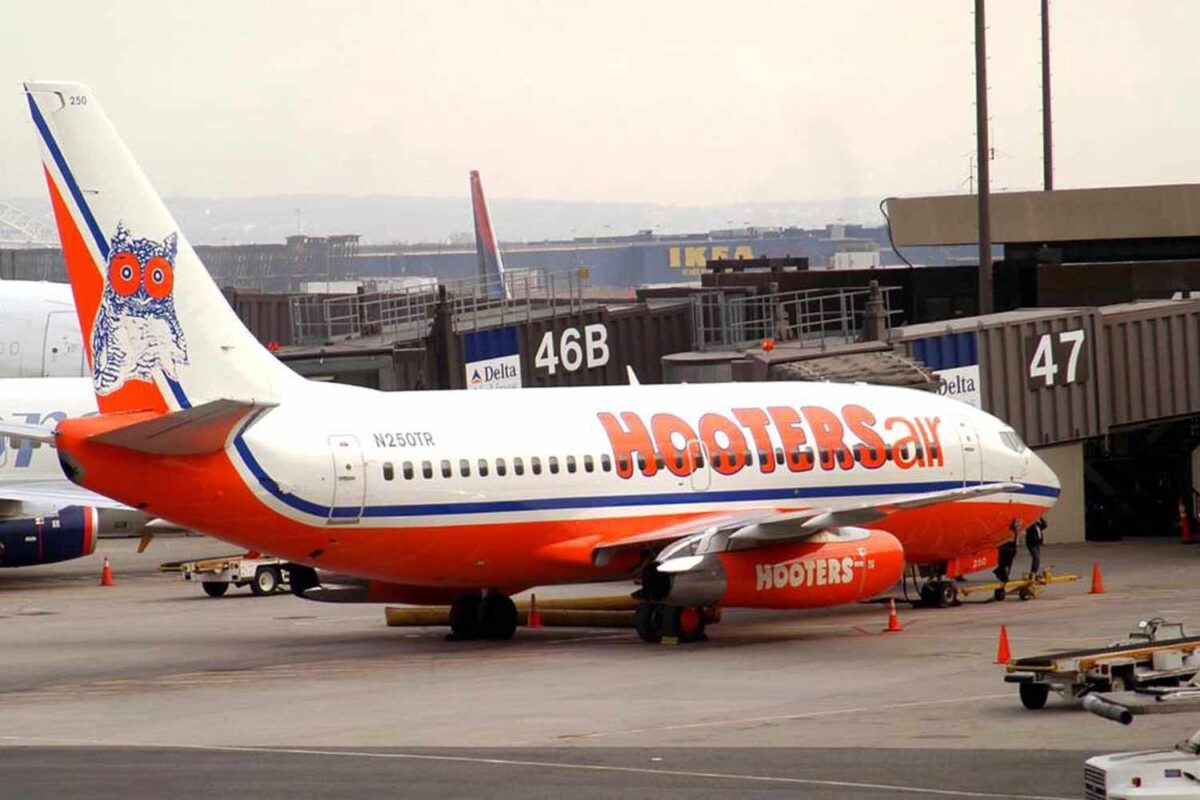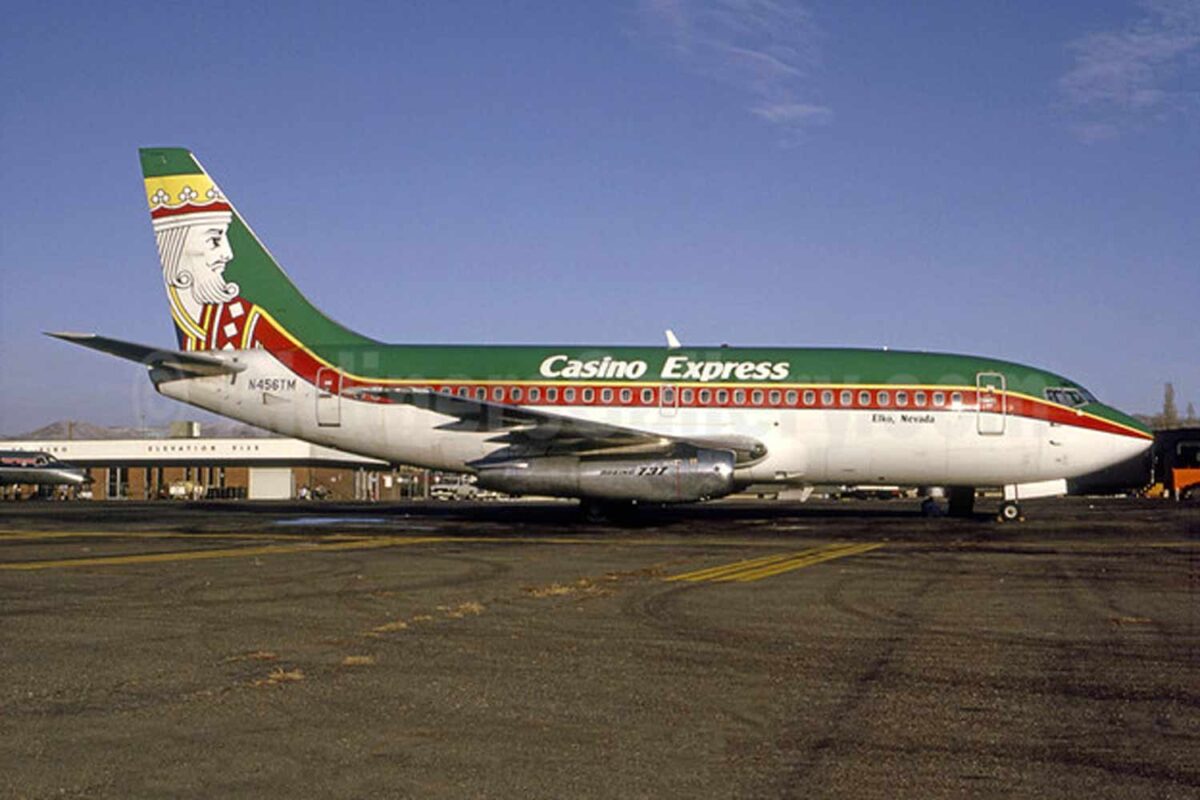
The aviation industry has changed a lot over time. Smoking used to be rampant, you never used to be able to find edamame chicken sandwiches, and everything used to have a classy allure.
The marketing industry has changed a lot too. Airlines have moved beyond “sex sells” and are now far more considered in their public relations.
All this in mind, there are a few airlines that, looking back, you’ll scarcely believe existed.
From Hooters’ Air and Casino Express Airlines to Vietnam’s bikini airline (which is actually still around), here are five airlines you’ll find hard to believe ever got past the ideation stage.
Smokers Express (1993-1993)
The wacky brainchild of two Florida businessmen (one of them a former Walt Disney executive), the concept behind Smokers Express was to give customers the ability to smoke from start to finish of a flight – a freedom that had been taken away in 1990 when the Federal Aviation Administration (FAA) banned smoking on almost all domestic flights.
The airline would be exclusively for smokers. To get around the smoking ban, it was “membership only” (i.e. not public). Members would have to pay $25 to join, and you had to be at least 21 years old to do so.
William Walts and George “Mickey” Richardson (the dynamic duo who founded it) figured they could hand out free cigarettes, offer full-size ashtrays and make a tonne of money selling ad space on the outside of their aeroplanes, just like race cars did.
Smokers Express was also meant to have VIP lounges free headphones, movies in flight, complimentary newspapers and “real food for real people” (steak, burgers, sub and pizza). Also up for grabs were free lotto tickets for each passenger, free destination maps and a non-smoking section at the back.
Profits the airline made were planned to go to charities.
It all sounded (other than the whole lung cancer thing) fabulous. But it never got off the ground. Its first-ever scheduled flight was cancelled due to lack of demand, and interest never improved enough for the airline to be viable. Given the first flight was for a $345 round trip ticket for people to fly to Washington from North Carolina to protest then-president Bill Clinton’s proposed tobacco tax increase, perhaps the company was also a bit too political to be successful.
Hooters Air (2003 – 2006)

Hooters, the American restaurant chain known for its hot wings and tank tops, had a crack at running an airline in the early 2000s. Hooters Air was based in Myrtle Beach, South Carolina, and offered cheap, direct flights to 15 destinations in the US. These destinations included Las Vegas and Denver. Tickets were a flat rate of $129 each way. But Hooters Air didn’t last long. After about three years it became a $40 million dollar failure.
While it was running, the airline was run by a normal flight crew (not actually by Hooters’ staff). To justify the branding, alongside the flight crew, each flight had two Hooters servers from a nearby Hooters on board. They weren’t trained as flight attendants though so they couldn’t push the drinks cart or open the cabin doors. Their job was to “entertain and ask trivia questions and all that” one Hooters girl told local media at the time.
RELATED: Vegas ‘Mile High Club’ Airline Slammed As ‘Unethical’
Bob Brookes, who had bought Hooters years before starting Hooters Air, started Hooters Air by buying small, North Carolina-based charter airline called Pace Airlines (and repainting it with the Hooters Air logo) in 2003. By 2006 he gave up on the venture and Hooters Air was no more.
Casino Express Airlines (1989-2005)

Casino Express was a bit like Smokers Express, except it actually succeeded for a time. It began on a Boeing 737-200 and the airline flew for Red Lion Hotel and Casino in Elko, Nevada. According to Gizmodo, Casino Express Airlines “flew nonstop flights between Elko and nearby cities like Portland, Oregon, Seattle, Santa Fe, and El Paso.”
The flights were very cheap for the era, with the company banking on travellers frittering away money in the casino.
The ploy worked – but in the end not enough to maintain profitability. Eventually, Casino Express Airlines was deemed to be not worth the dynamite to blow your hat off, and was sold to Xtra Airways.
Pet Airways (2009 – unknown)
Pet Airways started in 2009. Its mission? To be the first airline to just transport pets – and not human passengers – in specially equipped main cabins. They didn’t last long though, which is a shame because their Shelter-Pet Relocation Program was a good initiative which, according to Readers Digest, “provided life-saving flights for rescue pets by sending them from cities with too much supply to cities where the demand is high for adoption.”
RELATED: New Aviation Laws Spark ‘Furry’ Debate In Australia
We’re not sure exactly when Pet Airways went bust but its Twitter account is still active, so maybe some day they’ll make a come back.
Vietjet Air (2011 – to date)
Vietjet Air is an airline that is still alive and kicking. It was founded in 2007 and commenced operations in 2011. When it first started, it became the second private airline to offer domestic service in Vietnam. It has also, over the years, become known for its risque advertising, which has featured flight attendants in bikinis.
RELATED: ‘Bikini’ Airline Spends $6.5 Billion On Jets… & An Untold Sum On Dancing Flight Attendants
Despite the controversy around its advertising, one Insider writer who flew on Vietjet Air wrote that it’s not as wild as it is sometimes made out to be, calling it a good choice if you are after an inexpensive, quirky airline.
The same writer added that there were “hidden fees for add-ons like checked bags and drinks” which help claw back money on the cheap fares and that “one of my three flights was significantly delayed.” They also pointed out that “flight attendants on most Vietjet flights do not actually wear bikinis.”
Read Next
- The Day I Realised The Golden Age Of Business Class Travel Was Over
- Embarrassing Mistakes Business Class Travellers Make When Flying Economy
The post 5 Wild Airlines You Won’t Believe Actually Existed appeared first on DMARGE.
0 Commentaires